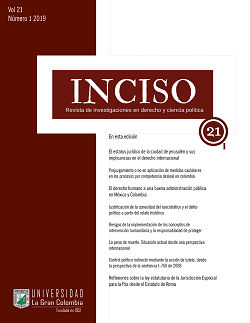El derecho humano a una buena administración pública en México y Colombia
DOI:
https://doi.org/10.18634/incj.21v.1i.841Palabras clave:
Acción de tutela, administración pública, derechos humanos, juicio de amparo, mecanismos de protección, principiosResumen
El derecho humano a una buena administración pública se empieza a contemplar como una posibilidad de discusión y debate internacional, gracias al reconocimiento expreso que hizo de esté la Carta de los Derechos Fundamentales de la Unión Europea, expedida en el año 2000, en su artículo 41; pero no se puede desconocer que los Estados con anterioridad han tratado este tema aunque ocultamente o mejor dicho tácitamente, al garantizar una serie de derechos que dan como resultado que se pueda hablar de este derecho como humano y por ende fundamental al interior de sus ordenamientos jurídicos, tal es el caso de México y Colombia.Descargas
Referencias
Arana, J. R. (2011). el derecho fundamental a la buena administración y centralidad del ciudadano en el derecho administrativo. EL DERECHO FUNDAMENTAL A LA BUENA ADMINISTRACION Y CENTRALIDAD DEL CIUDADANO EN EL DERECHO ADMINISTRATIVO. ciudad de mexico.
Asamblea Nacional Constituyente. (1991). Constitución politica de Colombia. 35. Bogota D.C., COLOMBIA.
Cámara de Diputados del H. Congreso de la Unión. (1917). Constitución política de los Estados Unidos Mexicanos. Mexico.
CLAD. (2013). Carta Iberoamericana de los Derechos y Deberes del Ciudadano en Relación con la Administración Pública. Panama, Panama.
Congreso de la Republica De Colombia. (2011). Codigo de procedimiento administrativo y de lo contencioso administrativo Ley 1437 De 2011. Bogota D.C, Colombia.
Cuarto Tribunal Colegiado en Materia Administrativa del Primer Circuito. (2013). Tesis aislada I. 4o.A.35. A (10a). México.
Durán Martínez, A. (2010). la buena administración. Estudios de derecho administrativo.
Ferrajoli, L. (2005). Los fundamentos de los derechos fundamentales (2a. ed.). Madrid: Trotta.
Gobierno de Ciudad De Mexico. (2016). Constitución política de la ciudad de México. Ciudad de Mexico.
Gobierno del Estado de México. (1995). Constitución política del Estado libre Y soberano de México. Estado de Mexico.
Hernandez sampieri, r., fernandez collado, c., & baptista lucio, p. (2014). metodología de la investigacion Sexta edición. Mexico D.F: Mcgraw hill.
López Olvera, M. A., & Pahuamba Rosas, B. (2014). Nuevos paradigmas constitucionales (1a. ed.). México: Espress.
Parlamento Europeo. (2000). Carta de los derechos fundamentales. Niza, Francia.
Rodríguez García, A. (2015). derechos fundamentales, participación ciudadana y buena administración. referencia a la Venezuela actual. En J. Rodriguez- Arana Muñoz, & L. J. Béjar Rivera, el derecho administrativo en iberoamérica en homenaje al profesor Mariano Brito tomo I. Mexico: Espress. Especialistas en Responsabilidades S.C.
Rotondo, F. (2015). derechos fundamentales y derecho administrativo tomo 1. En L. J. Bejar Rivera, & J. Rodríguez-Arana Muñoz, El derecho administrativo en iberoamerica. Mexico D.F.: espress.


 BASES
BASES DE DATOS
DE DATOS




